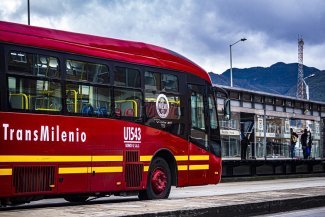A family of Syrian migrants crosses a field in northern Greece in 2016.
For the weekly edition of our summer retrospective series on current events, the subject of migration is one that Equal Times could not ignore.
In fact, you could argue that we should be using the term ‘migrations’ as we are discussing many different types of migrants, including economic migrants, refugees and asylum seekers, each of which represent different realities. These groups include both people who chose to migrate and people who had no choice, both those who are just passing through and those who plan to stay in their receiving countries.
Today virtually all countries are affected by migrations and it would be incorrect to assume that they only go in one direction: from poor countries to rich countries. While it might be hard to believe for some European and North American citizens who feel threatened by the waves of new arrivals, the countries hosting the most refugees are not in the West. Rather, it is countries like Turkey, Pakistan and Lebanon that must manage, often with no help, more than a million people in need.
It should not be forgotten that migration is first and foremost a proximity-based phenomenon between neighbouring countries and that some of the poorest countries on earth, such as Ethiopia, Chad and Sudan, each welcomed more people in 2016 than France or Germany.
Just one month ago, 192 UN member states (with the notable exception of the United States) recognised the need for improved international cooperation when they approved an important draft agreement: the Global Compact for Safe, Orderly and Regular Migration. The agreement is set to be adopted definitively in December and will mark the first effort at cooperation on this issue in many years. It could also play a role in combatting human trafficking, one of many dangers that accompany the journey into exile.
Reaffirming the principles of human rights seems more necessary than ever as more walls and barriers rise and more ports of entry close. Many leaders seem to forget that their countries are signatories to treaties such as the 1951 Geneva convention which defines the right to asylum and refugee status.
Countries like the United States and Australia, themselves “nations of immigrants”, are closing their borders with contempt and cruelty to those seeking a better future. In an article on Equal Times, journalist Martin Watters reported on the fate of asylum seekers detained on an island by the Australian government. “Currently there are over 2000 people who have been languishing in remote islands in the Pacific who are being held hostage to this policy,” said Amy Frew, a lawyer for Australia’s Human Rights Law Centre.
Fortunately, other countries and local communities are providing support to those seeking refuge or a better life. Uganda, for example, has stood out in its efforts to welcome foreigners, primarily those from Sudan, as journalist Evelyn Lirri and photographer Nicholas Bamulanzeki recently reported. Even though the situation is not perfect for everyone, it shows that withdrawal is not the only answer.
Among those providing support are many NGOs, including SOS Méditerranée. With its iconic boat the Aquarius, the organisation rescues migrants who have set sail to reach the coasts of Europe. To date, SOS Méditerranée has carried out over 100 rescue missions and saved almost 30,000 lives. The organisation continued to save migrants from drowning this week. It is worthwhile to read the report by Anna Benjamin who participated in their very first mission at sea in February 2016.
Once they arrive, migrants seek employment. This is the area where the hypocrisy of politicians is the most striking: we don’t want foreigners, but we do want them to do our least rewarding work.
Equal Times regularly documents the reality of these “migrant jobs”, which are often accompanied by serious violations of fundamental workers’ rights: domestic workers in the Middle East, agricultural labour in Italy, street vendors in Spain, etc. Amongst countless possible examples, we’ve chosen once again to shed light on the plight of Venezuelan refugees in Peru, where many engineers and architects are selling donuts or empanadas, working without contracts and subject to abuse.
As a concluding remark, it is worth mentioning that many experts consider the phenomenon of mass migration to be still in its infancy. Refugees currently represent less than 1 per cent of the world’s population and are predominantly people fleeing war and oppression. But what will happen when “climate refugees” become a reality? In the final article of our selection, Steve Rushton reminds us that “climate refugees are not recognised or protected by international law”. This is another challenge facing humanity in terms of both the environment and human rights.
Australia’s hard line on refugees leads to a cycle of offshore horror
By Martin Watters
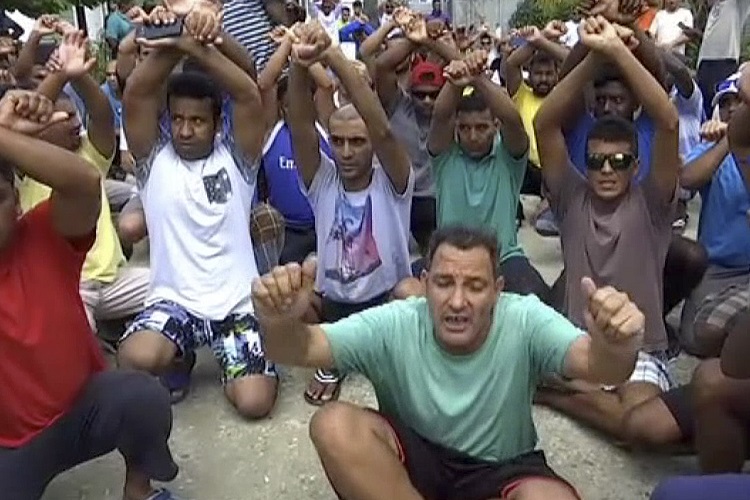
In this still from an Australia Broadcasting Corporation video made on 31 October 2017, asylum seekers protest the closure of their detention centre, on Manus Island, Papua New Guinea.
There are currently hundreds of men detained on a remote island in the north of Papua New Guinea (PNG), after trying to seek refuge in Australia. Some are ill or injured, many are mentally traumatised and most have been on Manus Island – dubbed “Australia’s Guantanamo” – for three to four years.
Despite international condemnation of their plight, their future remains uncertain. The men are victims of Australian government policies targeting asylum seekers trying to reach its shores by boat.
Read the full article on Equal Times
Starting over in the “most refugee-friendly country in the world”
By Nicholas Bamulanzeki
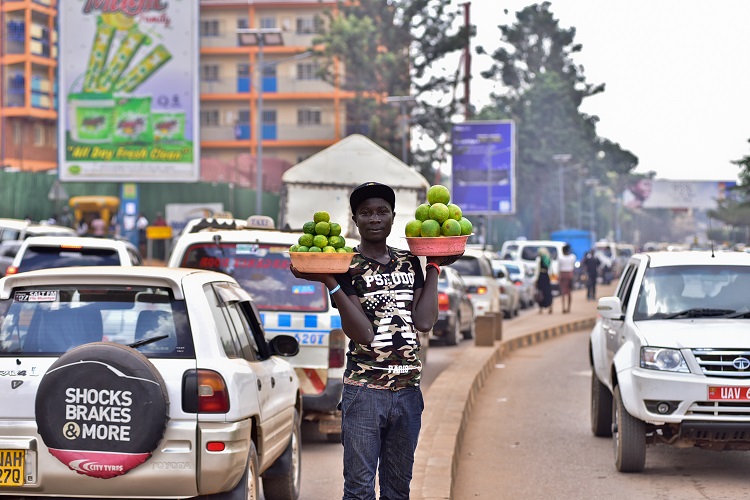
A street vendor sells fruit on a busy street in Kampala, Uganda.
It has been called a ‘refugee paradise’ and ‘the most refugee-friendly country in the world’. Those who aren’t quite so evangelical simply laud Uganda for its progressive refugee policy. And with good reason.
Last year, Uganda took in more refugees than any other country in the world, and at present, more than 1.35 million refugees have settled in Uganda, primarily from South Sudan. The vast majority of refugees in Uganda live in settlements such as Bidi Bidi – the world’s largest refugee camp – where they are given plots of land, food, basic goods, access to public services and freedom of movement.
Read the full article on Equal Times
The Aquarius: the solidarity boat that sets sail to rescue refugees
By Anna Benjamin
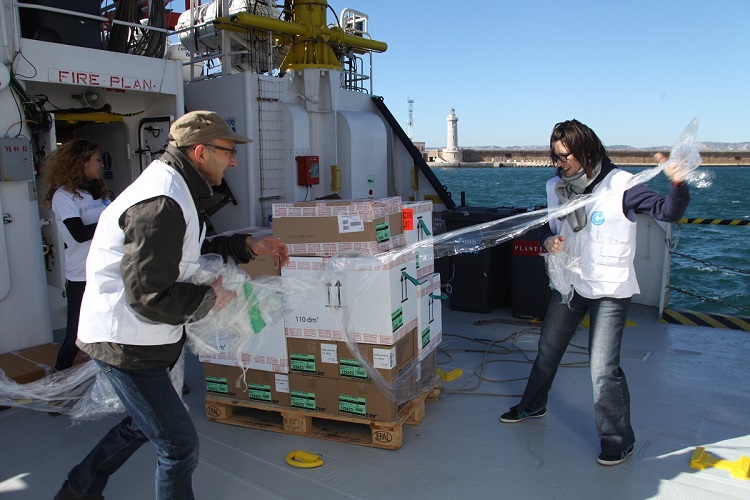
A 25-person crew – seafarers, rescue workers, doctors and nurses – coordinates the operation on the boat which can take up to 500 shipwrecked refugees.
In the port of Marseille, the fluorescent orange hull of the 77 metre long Aquarius can be seen from far away. Seafarers are loading dozens of boxes onto the deck. Forming a human chain, doctors and nurses wearing lifejackets bearing the logo Médecins du monde (Doctors of the World) carry them inside the boat. Despite the tension and tiredness, it is a well practised routine. These are the final preparations before departure.
On Saturday the Aquarius, which arrived in the Mediterranean city two days earlier having been chartered from the Baltic, set sail for an unprecedented mission to the Strait of Sicily, off the Italian and Libyan coasts: the biggest refugee rescue operation organised by an NGO, the SOS Méditerranée.
Read the full article on Equal Times
Venezuelan migrants suffer precarious conditions in Peru’s informal economy
By Jack Guy
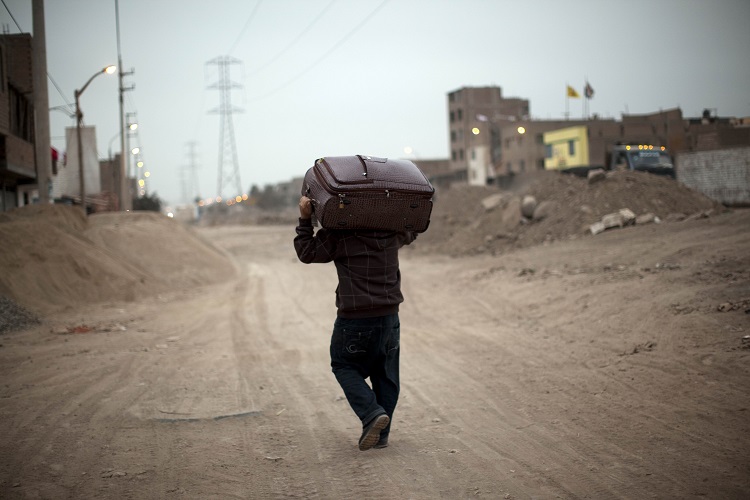
A man hauls a suitcase along a dirt road in the Santa Rosa Chuquitanta neighbourhood in Lima, Peru. The crisis in Venezuela has prompted thousands of Venezuelans to flee for Peru, where they often end up working in the informal economy.
Luis Ferrer fled to Peru after his fellow students were killed in anti-government protests in Venezuela. But there he found a different nightmare, typical for migrants, working long, hard hours in a Lima restaurant.
“I had a job doing 12-hour shifts washing dishes, but they didn’t only make me do that but also chopping, cooking and waiting tables.” With no contract and terrible working conditions, the 23-year-old Venezuelan left that job after a few days and without pay. “Some jobs don’t ask for a permit but the work they make you do is very demanding. It’s basically exploitation.”
Thousands like Ferrer are employed in businesses ranging from street vendors to restaurants and bars to beauty salons and warehouses, the vast majority working off the books without contracts or labour protection. Unscrupulous bosses also take advantage of recent arrivals who have no idea about how much they should earn, and no legal recourse to demand their rights.
Read the full article on Equal Times
Unions and NGOs gather in London to stand up for climate refugees
By Steve Rushton
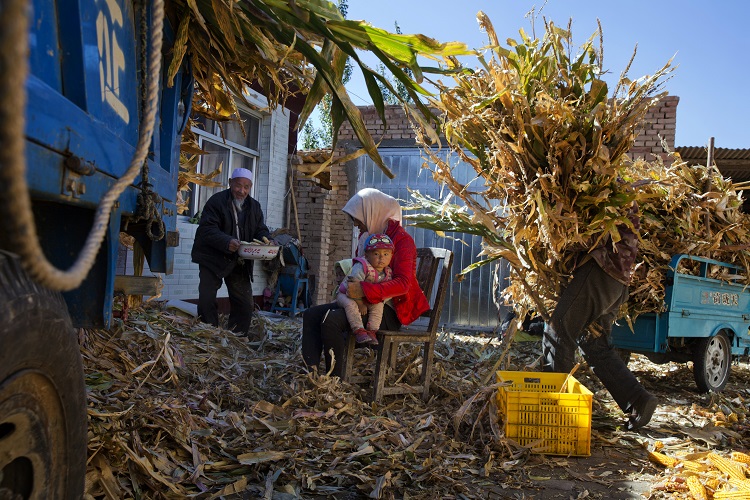
In this photo taken on 10 October 2015, residents who were relocated from a drought-affected region elsewhere in the country sort out maize stalks at their new home in Hongbusi in northwestern China’s Ningxia Hui autonomous region.
While US President Donald Trump may not believe that climate change is a result of human activity – a position which flies in the face of decades of scientific research – one thing is undeniable and that’s the devastating impact of soaring temperatures on people and communities across the world.
In 2016, for example, Pakistan and India were hit by a heatwave which saw temperatures peaking at 51°C, posing a major threat to human life, according to Asad Rehman, a senior international climate campaigner with Friends of the Earth.
“When these heatwaves reoccur the government has to ask itself what it can do: the only answer is dig more mass graves.”








